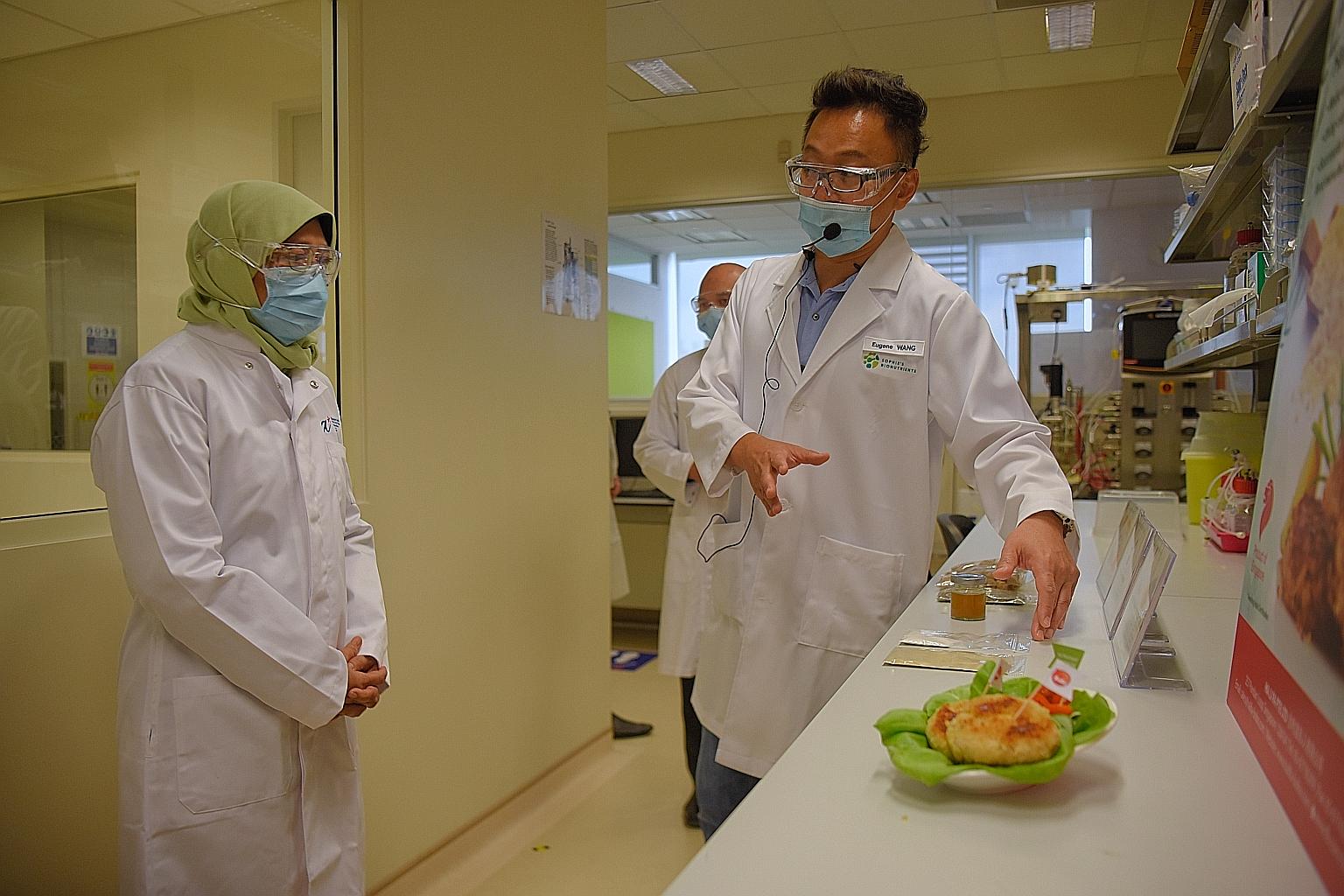Local start-up dreams of feeding astronauts microalgae-based food
Sign up now: Get ST's newsletters delivered to your inbox

Sophie's Bionutrients chief executive Eugene Wang showing President Halimah Yacob a sample of plant-based crab cakes at the Singapore Institute of Food and Biotechnology Innovation's lab during her visit on Thursday.
ST PHOTO: MARK CHEONG
Shabana Begum , Shabana Begum
Follow topic:
Entrepreneur Eugene Wang's dream is to some day see Singapore feeding astronauts sustainable, tasty and nutritious food as they explore space. His astronomical ambitions, however, are rooted in a microscopic solution - microalgae.
These tiny greens are packed with minerals and vitamins, and are 60 per cent protein. In comparison, soya - the most protein-rich plant - comprises 30 per cent protein.
Microalgae, once an underrated superfood, is fermented in a bioreactor and within three days, edible protein flour can be extracted and used to make various plant-based foods.
"We can design a small bioreactor and harvesting system, and fit it into a spacecraft. Singapore can come up with a wonderful space food programme for space missions," said Mr Wang animatedly.
But before that happens, the chief executive of food-tech start-up Sophie's Bionutrients wants to feed the Republic.
The company's first production facility in Science Park 2 will be up and running by the second half of next year. The 464 sq m facility will have industry-scale bioreactor tanks along with other equipment such as spray dryers.
The company is working with four strains of microalgae, sourced from overseas. The new facility - which will harvest the protein from a 20,000-litre tank - will have the capacity to produce 10 tonnes of protein flour a month, said Mr Wang.
The company's chief operating officer Barnabas Chan said: "To produce a tonne of soy protein, you need 5ha of land. For us, it's about 0.02ha of land."
On Thursday, President Halimah Yacob visited the start-up at the Singapore Institute of Food and Biotechnology Innovation's (Sifbi) lab at the Agency for Science, Technology and Research. Sifbi is the start-up's research and development collaborator.
She said it is important to look at all options in alternative food sources, so that Singapore can meet its goal of producing 30 per cent of its nutritional needs within a decade to boost its food resilience.
"The vagaries of weather, climate change and having to reduce carbon emissions make it difficult for us to just look at traditional methods of growing food."
It was announced last week that Singapore was the first in the world to approve cell-cultured meat for sale as food. It was developed by Californian start-up Eat Just, which will be manufacturing its cultured chicken bites here.
Other start-ups here have developed prototypes of cell-cultured seafood, pork and milk as well.
The President also highlighted how Sophie's Bionutrients uses industrial food waste such as soya pulp from tofu manufacturers to feed the microalgae while it is fermenting and help it multiply.
The start-up's white, odourless protein flour will eventually be supplied to companies in the United States to create plant-based milk. Its brown flour, which smells like seaweed and has an umami flavour, will be used by two food manufacturers to create plant-based "chicken essence" and "crab cakes".
The protein flour will be sold to food companies at about US$30 (S$40) per kilogram next year, said Mr Wang.
He hopes to sell it at US$2 per kilogram within five to 10 years, as production scales up and massive 300,000-litre tanks are used. This way, his protein can feed developing countries as well.

